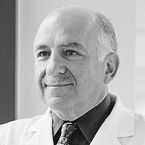
Joseph V. Simone, MD, a former member of the AACR Board of Directors and an innovative leader of several of the nation’s preeminent cancer centers, died January 21, 2021, at the age of 85.
Simone was born September 19, 1935, in Chicago. He earned his bachelor’s degree and medical degree from Loyola University in Chicago, then completed his internship and residency at Presbyterian-St. Luke’s Hospital (known today as Rush), and a fellowship at the University of Illinois.
In 1967, Simone joined St. Jude Children’s Research Hospital, where he was part of the team that ran the Total V clinical trial, which led to dramatically improved survival rates for children with acute lymphoblastic leukemia. He later helped establish St. Jude’s HIV/AIDS clinical program, and he held positions as associate director for clinical research, director, and chief executive officer.
After nearly 25 years at St. Jude, he became physician-in-chief at Memorial Sloan Kettering Cancer Center in New York, where he developed new ways of measuring the quality of health care. He became deeply involved with national efforts to improve the quality of cancer care, serving on the Institute of Medicine’s National Cancer Policy Board from 1996 to 2005. Some of the research he conducted formed the basis for the Quality Oncology Practice Initiative (QOPI) certification program, administered by the American Society of Clinical Oncology (ASCO).
From 1996 to 2001, Simone was a professor at the University of Utah and held several leadership positions at the university’s Huntsman Cancer Institute. In later years, he served as a consultant to hospitals and cancer centers and became a director pro tempore of the Shands Cancer Center at the University of Florida. He served as founding chair of the National Comprehensive Cancer Network, president of the Association of American Cancer Institutes, and vice chair of the Pediatric Oncology Group.
Simone joined the AACR in 1972. He was honored with the AACR-Richard and Hinda Rosenthal Foundation Award in 1979, an award recognizing physicians under the age of 51 whose research has made, or promises to soon make, a notable contribution to improved clinical care in the field of cancer. He served on the AACR Board of Directors from 1997 to 2000, and served with distinction on several committees, including the Public Education Committee and the AACR Joseph H. Burchenal Award Committee from 1998 to 1999; the Pezcoller Foundation-AACR International Award for Cancer Research Committee from 2002 to 2003; and the SU2C Scientific Advisory Committee in 2008.
Other career awards included the Healing Arts Award from the Memphis Chapter of the National Hemophilia Foundation in 1971; the LeRoy Hoeck MD Award of Academic Excellence from the Children’s National Medical Center in 1993; the Ronald McDonald House Charities Award of Excellence; and the Stritch Medal from Loyola University Chicago in 1999. He was also recognized with the Distinguished Service Award for Scientific Achievement from ASCO in 2002; the ASCO Public Service Award in 2006; the Distinguished Service Award from the Association of American Cancer Institutes in 2008; and the ASCO-American Cancer Society Award in 2010. In 2016, ASCO established the Joseph V. Simone Award and Lecture for Excellence in Quality and Safety in the Care of Patients with Cancer in his honor.
“Joe Simone will be sorely missed. He was a brilliant physician-scientist and leader whose relentless drive to improve the quality of cancer care benefited countless numbers of patients,” said Margaret Foti, PhD, MD (hc), chief executive officer of the AACR. “He was a special friend and an outstanding cancer center director and advisor in the field.”
Leave your remembrance of Dr. Simone below.
Joe Simone is one of those individuals you remember the moment you met them. Such was the impact he had on others with his sincerity and passion to help others, especially patients. Joe’s contributions spanned the spectrum from research, to his writings describing the characteristics of the ultimate physician. Many had the good fortune to know Joe as a leader, mentor, and friend. His wisdom and advice, with emphasis on identifying and meeting the needs of patient’s and their families, provided a true north for all us in pursuing our careers in cancer research and providing a holistic approach to cancer care.
R.I.P. Joe
Joe could identify the real deal and he knew that winners never cheat, and that it is always possible to do the right thing
RMW